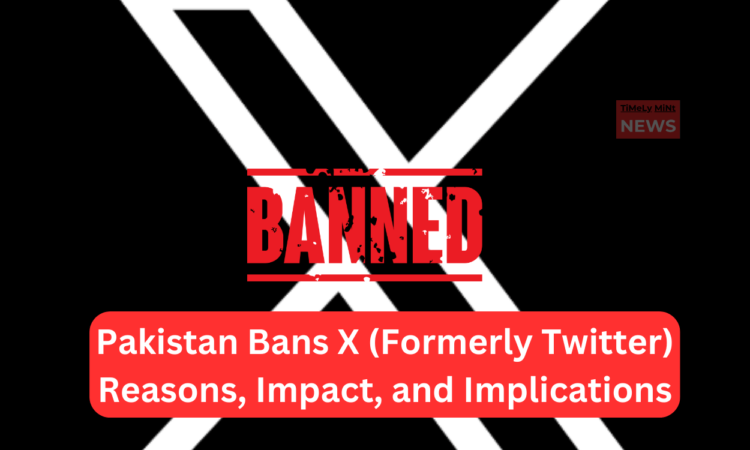In a significant move, Pakistan has implemented a ban on the social media platform X (formerly known as Twitter) as of Wednesday, April 17, 2024. The decision, citing concerns over the platform’s alleged misuse and failure to respect Pakistan’s sovereignty, has sparked widespread debate and criticism from various quarters. This article delves into the reasons behind the ban, its impact on users and society, the government’s response, and the legal implications of the restrictions.
Background on X and Its Popularity in Pakistan
X, the social media giant formerly known as Twitter, has enjoyed immense popularity in Pakistan, with millions of users relying on the platform for communication, entertainment, and information. Notable figures, such as former Prime Minister Imran Khan, boast a massive following on X, with over 20 million followers, making him the most followed Pakistani on the platform. The Pakistan Tehreek-e-Insaf (PTI) party’s official X account also has a record 10 million followers, highlighting the platform’s significance in the country’s political landscape.
Reasons Behind the Ban
The Pakistan Telecommunication Authority (PTA) implemented the ban on X, citing the following reasons:
- Concerns over the platform’s “misuse” and failure to respect Pakistan’s sovereignty
- Alleged connection to social unrest following the February 2024 parliamentary elections
- Lack of official comment or clarification from the PTA and government officials regarding the specific nature of the alleged misuse
Despite the cited reasons, the government has not provided detailed justifications or evidence to support their claims, leading to speculation and criticism from various stakeholders.
Impact on Users and Society
The ban on X has far-reaching consequences for the people of Pakistan:
| Impact | Description |
|---|---|
| Affected Users | Millions of users rely on X for communication, entertainment, and information |
| Service Disruption | The general public faces frustration and inconvenience due to the unavailability of the platform |
| Political Suppression | Political parties, such as PTI, claim the ban suppresses their voice on social media |
| Economic Losses | Businesses relying on X for marketing suffer from potential loss of customers and revenue |
The sudden disruption of services has led to widespread discontent among the populace, with many viewing the ban as an infringement on their fundamental rights.
Pakistan Government’s Response and International Reaction
The Pakistani government’s response to the ban has been characterized by a lack of transparency and responsiveness:
- The PTA implemented the ban without providing specific details or justification
- Government officials have not responded to queries or provided a timeline for lifting the ban
- International criticism has poured in from human rights groups, the United States, Britain, and the European Union, calling for the complete restoration of access to X and respect for freedom of expression
The government’s silence and inaction have further fueled concerns over the motives behind the ban and its impact on democratic values.
Legal Implications
The ban on X raises serious legal concerns, as it appears to violate several fundamental rights enshrined in the Constitution of Pakistan:
- Violation of the rights to freedom of speech, press, and access to information under Article 19
- Lack of due process in implementing the ban without formal notice or notification
- Defiance of court orders, such as the Sindh High Court’s directive to lift the ban
- Concerns over stifling the democratic process and undermining democratic values
- Potential economic consequences for businesses and the country’s overall stability
The legal battle surrounding the ban is ongoing, with the Sindh High Court ordering the PTA to restore access to X. However, the court’s decision remains unenforced, and a case of contempt is being heard due to the PTA’s failure to comply with the directives.
Public Reaction and Circumvention Attempts
The public’s reaction to the ban has been largely critical, with many viewing it as an act of censorship:
- Human rights activists and the general public oppose the ban, demanding the restoration of internet services and access to social media
- Users have resorted to using virtual private networks (VPNs) to bypass the restrictions, although VPN accessibility remains limited in Pakistan
- Caretaker Prime Minister Anwaar ul Haq Kakar used a VPN to claim that the country had not imposed a ban on X, further adding to the confusion and controversy surrounding the issue
The ban has also raised concerns over the spread of disinformation, as people may turn to unreliable sources for information in the absence of access to mainstream social media platforms.
Conclusion
The ban on X in Pakistan has far-reaching implications for the country’s democracy, economy, and the fundamental rights of its citizens. The lack of transparency and responsiveness from the government, coupled with the defiance of court orders, has led to widespread criticism and concern. As the legal battle continues and international pressure mounts, it remains to be seen how the situation will unfold. The resolution of this issue will have significant consequences for Pakistan’s future, its relationship with the international community, and the rights of its people in the digital age.
For the latest updates on the X ban in Pakistan, follow The Diplomat and Hindustan Times.














